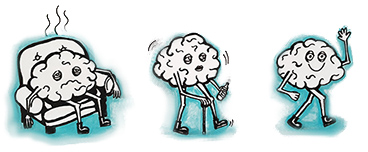Additional management / services
 Hearing symptoms
Hearing symptoms
Not all your symptoms may be a direct result of concussion. An injury that causes concussion can also cause trauma to other parts of the body. The middle and inner ear are areas that are commonly affected by a force to the head. As a result, you may have a mix of concussion and ear-related symptoms.
Ear symptoms can include:
- Loss of hearing in one or both ears
- Noises or ringing in the ears or head (Tinnitus)
- Loss of balance, dizziness or understanding of position in space
- Sense of pressure, fullness or pain in one or both ears
- Clear discharge or bleeding from the ear canal
- Dizziness triggered by loud noises, sneezing or coughing (semicircular canal dehiscence or SCCD)
- Loud internal body noises of own voice, chewing, footsteps or eye movements (autophony) (also SCCD).
It is important to know what is causing these symptoms so that you can receive the correct advice for management. The ear related symptoms (hearing, ear pressure, fullness and tinnitus) can be referred to an audiologist initially and symptoms such as discharge and vertigo to ENT (Ear, Nose and Throat) specialist doctor. You may need to see both specialists.
 Neck symptoms
Neck symptoms
Symptoms following concussion are not always specific to brain injury. Movement forces to the head and neck at the time of concussion can result in injury to the cervical spine (neck) and supporting muscles. The neck plays an important role in giving feedback about where the head is in space and sensors in our neck also help the visual and vestibular (balance) systems. Given these connections, ongoing symptoms such as dizziness, headache, blurred vision, vertigo, poor concentration and memory can occur from both prolonged post-concussion symptoms or due to a cervicogenic / neck injury.
Returning to normal movement and graded activity post injury is important to help the neck recover. Completing gentle range of movement neck exercises can assist in returning the normal and controlled movement to the neck post injury. This can minimise ongoing symptoms, including stiffness, tension and pain.
With ongoing symptoms, you may notice you change the way you move and / or hold your head after an injury (eg turning your whole body to turn your head instead of just turning at the neck, holding your head off to one side or even holding tension in your neck muscles by bringing your shoulders up to your ears). These examples are often protective or compensatory habits. If you notice you are doing these things, try to:
- Return to normal movement by resetting your head position and posture
- Relax any muscles with tension (eg dropping your shoulders)
- Complete gentle range of movement neck exercises to help build control and support around the area.
If you have ongoing cervicogenic / neck issues, a review by a musculoskeletal or concussion specific physiotherapist is recommended to further examine and treat ongoing issues. If there are signs of ongoing or progressive headaches, weakness, tingling, numbness or severe pain, a GP or a medical review is recommended.
 Vision symptoms
Vision symptoms
Vision symptoms, especially blurred or variable vision, headaches and increased light sensitivity, are very common following a concussion. This may be due to effects on the brain’s ability to control focusing and eye coordination. For some people these vision symptoms will improve quickly. Some people can continue to experience significant visual problems which interfere with their ability to read, use a computer, drive or even walk with good balance.
It is important to consult an optometrist with expertise in neuro-optometric rehabilitation, who can accurately assess the vision problems to determine what is causing the symptoms. Treatments may include spectacle lenses, prisms, tinted lenses, or vision therapy if indicated. Your eye health will be assessed as part of the comprehensive assessment.
The Brain Injury Vision Symptoms Survey (BIVSS) (PDF) is a well-researched and validated way of identifying the presence, and grading the severity, of vision symptoms following a concussion or other head injury. It can be filled out for your own records to keep track of your symptoms over time, as well as for a visit to an optometrist experienced in neuro-optometric rehabilitation care.


